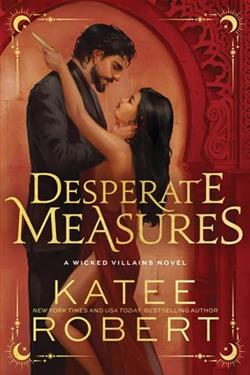Page 42 of The Promise of Jenny Jones
Her lack of doubt troubled him. “I want to play devil’s advocate for a minute.”
She scowled, then muttered, “Wait.” After whipping a dictionary out of her roll, she thumbed the pages, held the book to the sunset light streaming over her shoulder, then she nodded grimly. “Go ahead. Be an advocate, you’re a perfect devil.”
“All you have is Marguarita’s opinion that the Barrancas cousins intend to harm Graciela.”
“They just rode off with her, didn’t they?”
“From their point of view, they rescued Graciela from a stranger who stole her after her mother’s death.”
She threw up her good hand. “Mexicans are not as dumb as rocks!”
“I didn’t say they were,” he answered levelly, striving for patience. “I’m just raising the point that the cousins may have the same interest in Graciela as I do. She’s family. You have no right to her, they do.”
Jenny twisted in the saddle to glare at him. “By now everyone involved in this business knows that Marguarita died on the wall in my place. They know I sure as hell didn’t force her to die; it was her choice. They know I didn’t ride to the hacienda and steal the kid out of her bed; she was brought to me. They know Marguarita wanted me to take the kid to California. Count on it. From Dona Theodora on down, everyone knows exactly what happened and why.”
“If this unfolds the way it’s setting up, you and I are going to kill some Barrancas cousins,” he said stubbornly. “I want some assurance that I’m not killing people without a damned good reason.”
“Marguarita believed the cousins were murdering sons of bitches. She believed it enough to die rather than trust her daughter to one of them. That’s enough assurance for me.”
Ty reined in beside a shallow swale, then slid off his horse and walked down the incline to sniff, then sample, a thin puddle at the bottom. “The water’s muddy but drinkable,” he called up to Jenny. “We’ll camp here.” After he decided she wasn’t going to argue, he returned to unsaddle their horses and handle the heavier items that she couldn’t manage one-handed.
While he worked, he reviewed the scene he had witnessed in the cantina of the no-name village. His impression was that Cousin Emil had wanted Graciela for ransom. In retrospect, he recalled that Emil Barrancas had not actually said anything about a ransom. Perhaps the family loved the child and simply wanted her back home where they believed she belonged. That would explain the message from Dona Theodora Barrancas y Talmas. Dona Theodora expected the cousins to find and return the child to her. She didn’t want to lose Graciela to a strangerorto the Sanders and California.
It troubled him that events could have a different explanation than the one Jenny put forward. It was equally troubling to consider that she might be right. Marguarita certainly had believed the cousins were capable of evil. She had died because she believed it.
After eating plates of beans and tortillas, they settled before the flames, drinking coffee as fiery stars burned holes in the desert sky.
“I’m a brawler and a fighter, a shooter when I have to be,” Ty remarked, watching fingers of firelight dance across her strong features. “I’m not a murderer.”
“If you’re squeamish about killing, then head on back to California and wait for me and the kid to get there.”
He laughed. “Now who’s sounding stupid? You’re going to face down four men? You aren’t that good either, Jones,” he said, enjoying dishing back her earlier comment.
She narrowed her eyes, then suddenly she laughed, ending in a smile. The smile transformed her face. With the firelight rosy on her cheeks and lips, and the smile curving her mouth and lighting her eyes, she was beautiful. Ty stared at her.
“I’ve got you figured,” she said in that husky voice. “You’ll do what you have to because you promised your brother. You gave your word. You aren’t going anywhere without the kid, so I’m not worrying about having to fight alone.”
There was nothing to say. She was right, of course. She understood the power of a promise, saw a promise the same way he did.
“Do you have a family, Sanders? A wife and kids of your own?” Resting her coffee cup on her knee, she gazed at him across the flames, her expression unreadable.
“Hell no.” The question made him laugh. “I’m not the marrying kind.” When she continued to look at him, he leaned forward and poured more coffee into his cup. “A man like me can’t live with anyone.”
“Is that right?” She raised her coffee cup. “What makes you so ornery that no one could stand to live with you?”
“My ma said I was born mad.” He shrugged and gazed into the flames. “Maybe she was right.” He thought about it. “I never met a woman I could stand for more than a week.” A grin curved his mouth. “I imagine they felt the same about me.”
What began as charming feminine traits ended by irritating the bejesus out of him. Then came the naive and often silly or boring conversations. And the obsession with all the tiny nuances of etiquette with the inevitability of his forgetting something and offering insult. Not to mention the endless primping and smoothing and patting. The soft helplessness. And, most offensive, the ubiquitous efforts to change him. All women wanted to reshape a man into something other than what he was.
“So. What do you do with yourself when you aren’t in Mexico? You a drifter?”
“I drifted along the coast for a few years.”
“And then?”
“I always came home to the ranch.” His father’s ranch, and now his brother’s. He frowned. “Why are you asking all these questions?”
“No reason.” One shoulder lifted in a shrug that might have passed for indifference if he hadn’t known her as well as he was beginning to. “Talking around the fire, that’s all. Passing the time. No one says you have to answer.”















